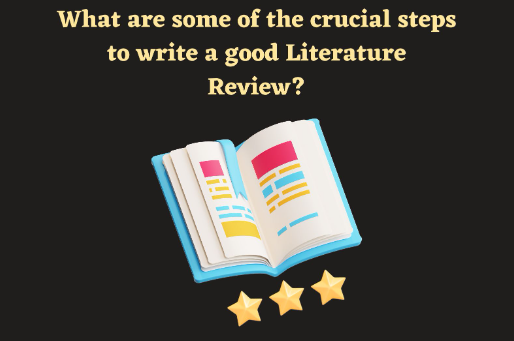How to write a good literature review? Follow these steps!
Do you need to write a literature review but don't know where to start? Don't worry, that's why I am writing this article for you. In this article, you'll be able to understand what a literature review is. And what are the unique ways to write it down?
What is a literature review?
A Literature review is a critical recap of what has already been researched on the topic. That could be anything from books to journal articles or other sources.Now let me make it more concrete and see how it works with this research problem.
What does social media do to the young generations' mental health?
But why is literature review so important
To find what is already known about the topic. And how other researchers have approached it.
Through this, you can discover that social media plays a role in affecting the young generation's body image.
Second, give your reader a critical overview of the currently existing knowledge, which shows how your research fits into it. It's good to look at the methodological approaches. Are they differentiating the same kind of social media or health issues?
Also Read: 5 Best Legit Essay Writing Services In The USA In 2022
Third, to find out what is missing from current knowledge. So that you can contribute something original, you can then narrow it down to eating disorders and the age group of 16 to 20 because it's not been done before.
Now we have a solid foundation, So you are ready to move on to the unique ways to write a good literature review. Or else you can request a write my paper for me service to write a literature review for you.
Steps on How to write a literature review
Here are some of the crucial steps that will help you to write a literature review
Search for relevant literature on your topic.
In this context, literature just means any academic resource like books or journal articles about your topic.
First, you need to search in the right scholarly database. Something like google scholar, Justor, or science direct. Search your keywords with boolean operators. To help you filter and refine the results.
Evaluate and select sources.
Unless your topic is a fine niche, you probably can't read every single thing that's been written on the topic. Once you have got the sources from step 1, read the abstract to scan whether an article is to the point or not.
You can also scan the bibliographies to find other sources. You should also pay attention to the google citation count on google scholar. If the count is high, the source is possibly important, and you should include it.
Identify themes, debates and gaps.
As you read, take notes and pay attention to the connection. And different sources. This way, you can organise your literature review's arguments. And the structure is a lot easier.
Here are some things to look for:
Trends and patterns, in theory, method or results. Themes debate or contradictions. Influential studies and gaps.
Outline your literature review's structure.
You can go about your literature review's structure in one or two ways. That depends on what you have found in the literature. And what you want to highlight.
Here are four common outlooks to structuring the literature review
1) Chronological
That means from older to more recent publications.
2) Thematics
That is organised around several key themes.
3) Methodological
For methodologies, you can compare the different research methods. Being used across the studies.
4) Theoretical
As for theory, you use it to discuss opposing theories or models.
Now, if you are searching for literature related to your topic, you can start by creating a list of keywords on your topic. For example, social media impacts the younger generation's body image. So for that, our list of keywords could be:
1)Mental health
2)Body image
3)Teenager
4)Social media
5)Facebook
6)Instagram
Once you've had that list of keywords ready, go to your favourite database. It could be the university's library catalogue, PubMed, science direct, or google scholar.
Now, for those who do not know how to type in their keywords and press enter, that's for non-professionals.
I am about to tell you two more tricks. To immediately narrow down your search and find much more related papers.
For the 1st trick, firstly you have to think and write down all the synonyms. Or sub-topics of the keywords that you are searching for.
In our case, generationZ, younger generations, and teenagers all represent the age group we're looking for. You can use boolean operators to help you refine the research. You can use these in all different databases. You use AND, so all the targeted keywords have to be included in the results and not just part of your search.
Once you find a source you think might be useful, make sure to read the abstract before diving into the head first. You'll get a glimpse of what the research is about. And know if it's relevant to your topic.
Once you have found the source that is relevant, check its bibliography and look for source titles. That seems related to your topic. Often you will be able to dig up some gems.
Conclusion
To find out the most important publications on your topic. Take note of recurring citations.
If the same writer's books or any articles keep appearing in your reading, make sure to find them out. Then you should definitely include it in your literature review!
So these were some steps and unique ways to write a literature review. Try to follow these steps and write your unique and perfect literature review.












